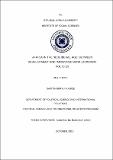Please use this identifier to cite or link to this item:
http://hdl.handle.net/11547/2175Full metadata record
| DC Field | Value | Language |
|---|---|---|
| dc.contributor.author | Yundze, Gaston Beryu | - |
| dc.date.accessioned | 2019-05-26T06:48:58Z | - |
| dc.date.available | 2019-05-26T06:48:58Z | - |
| dc.date.issued | 2016 | - |
| dc.identifier.uri | http://hdl.handle.net/11547/2175 | - |
| dc.description.abstract | Bu tezde, neo-liberalizmin Afrika’ya etkileri araştırılmış ve IMF ve Dünya Bankası’nın Afrika ülkelerine uygulamakta oldukları neoliberal politikaların değişmediği taktirde zararlı etkilerinin devam edeceği savunulmuştur. Kredilerin önkoşulu olan bu politikalar, kamu iktisadi teşebbüslerin özelleştirilmesini, ulusal paraların devalüasyonunu, tarife ve vergi gibi ticari engellerin kaldırılmasını ve özellikle kamunun sosyal hizmetler harcamalarında kısıtlamayı içermektedir. Bu tez, söz konusu neo-liberal politikalarla zengin ve fakirler arasındaki uçurumun daha fazla derinleştirdiğini ve Afrika kıtasındaki fakirliği çıkmaza soktuğunu savunmaktadır. Aynı zamanda fakirliği azaltma stratejilerinin uygulanmasının ve borçları hafifletme girişimlerinin, verimli yapısal uyarlama politikalarına katkı sağlayacağı öngörülmesine rağmen, mevcut durumda herhangi bir değişiklik yaratmadığı savunulmaktadır. | tr_TR |
| dc.language.iso | tr | tr_TR |
| dc.publisher | ISTANBUL AYDIN UNIVERSITY INSTITUTE OF SOCIAL SCIENCES | tr_TR |
| dc.subject | Afrika | tr_TR |
| dc.subject | Neoliberalizm | tr_TR |
| dc.subject | IMF | tr_TR |
| dc.subject | Dünya Bankası | tr_TR |
| dc.subject | Yapısal Uyarlama Politikaları (SAP) | tr_TR |
| dc.subject | Africa | tr_TR |
| dc.subject | Neoliberalism | tr_TR |
| dc.subject | IMF | tr_TR |
| dc.subject | World Bank | tr_TR |
| dc.subject | Structural adjustment Programmes (SAPs) | tr_TR |
| dc.title | AFRICA IN THE NEOLIBERAL AGE: BETWEEN DEVELOPMENT AND IMF/WORLD BANK ECONOMIC POLICIES | tr_TR |
| dc.type | Thesis | tr_TR |
| dc.description.abstractol | This thesis looks at the impacts of neoliberalism on Africa and argues that the neoliberal policies imposed on African countries by the IMF and World Bank will continue to be detrimental to these countries if changes are not made. These policies that come as conditions to loans include: the privatization of state owned enterprises, the devaluation of local currencies, the abolition of trade barriers like tariffs and taxes and the reduction in government spending especially on social affairs. The thesis argues that these policies have widened the gap between the rich and the poor and at the same time worsened the poverty situation in the continent. It also argues that the introduction of the poverty reduction strategies and debt relief initiatives are only intended to ensure the effective implementation of the structural adjustment policies and not to create change in the current situation of the poor. | tr_TR |
| dc.publisher.firstpagenumber | 1 | tr_TR |
| dc.publisher.lastpagenumber | 97 | tr_TR |
| Appears in Collections: | Tezler -- Thesis | |
Files in This Item:
| File | Description | Size | Format | |
|---|---|---|---|---|
| 469739.pdf | 1.38 MB | Adobe PDF |  View/Open |
Items in DSpace are protected by copyright, with all rights reserved, unless otherwise indicated.
